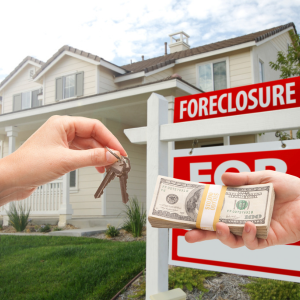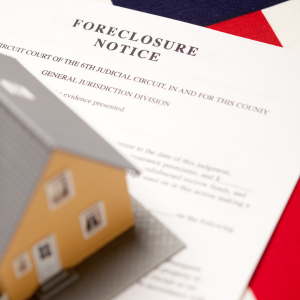
Understanding Foreclosure Processes in Chicago, IL
What you need to know about the eviction process can make a big difference if you’re a homeowner in Chicago. The courts handle foreclosure in Illinois. This is called “judicial foreclosure.” It usually begins when you miss a few mortgage payments and the lender files a case to start the process.
At this point, you’re in what’s called pre-foreclosure. That’s an opportunity, and you can still sell your home to avoid a full-blown foreclosure. It’s stressful, but you don’t have to go alone. Real estate professionals and attorneys familiar with foreclosure can guide you through the options, whether a short sale or trying to negotiate new terms with your lender.
Knowing the rules and deadlines that apply to Cook County is essential. Talking to local lawyers or property counselors can help you make better choices as you go through it.
Essential Legal Requirements for Foreclosure Sales in Chicago
Selling a home during foreclosure in Chicago isn’t just about listing the property; it involves legal steps that must be followed carefully. Illinois requires lenders to take foreclosure cases to court, meaning sellers must understand what’s expected at each stage.
It’s also possible to redeem your home, which means you might be able to keep it if you can pay off the debt within a specific time. For buyers to be safe, they need to know precisely what they’re getting.
That’s why it’s so important to work with an attorney who understands the foreclosure process in Chicago. They can help ensure all your paperwork is in order and critical details like unpaid liens aren’t missed. A Team Real Estate Solutions is here to help guide you through the process. Contact us today to get started.
Navigating the Chicago Real Estate Market During Foreclosure
Although it’s not easy, selling a foreclosed home in Chicago is possible if you plan. First, find a real estate professional who knows how your area’s foreclosure sales process works. They can help you sell your house to the right people and set the right price.
Making sure you can talk to your funder is also a good idea. Sometimes, options like short sales or loan changes can make the process go more smoothly. Also, don’t forget how helpful it can be to have a local lawyer help you with the legal side.
By staying informed and getting the right help, you can still come ahead, even in a challenging situation like foreclosure.
Key Steps to Selling a Foreclosed Property in Illinois

You must take essential steps to sell a foreclosed home in Illinois, especially in a busy market like Chicago. First, you should know that Illinois uses judicial default, meaning there is a court process.
From there, you’ll want to bring in a real estate professional who handles foreclosure sales. They’ll help with pricing and marketing. A professional appraisal can also give you a clearer picture of your home’s worth.
Ensure your documents are in order, including mortgage statements, legal notices, and any correspondence with your lender. You may also need to address liens or negotiate with the bank to move things along.
Presentation matters, too. Even if the home isn’t perfect, clean it up and stage it where possible. That effort can go a long way in attracting serious buyers.
How to Prepare Your Home for a Quick Sale During Foreclosure
Presentation is everything if you’re trying to sell your home fast while going through foreclosure in Chicago. Start by cleaning up, decluttering, and tackling easy repairs like leaky faucets or peeling paint. Neutral colors and tidy spaces can make a big difference.
Curb appeal also matters. Trim the yard, power wash the siding, and make sure the exterior looks as inviting as possible. Staging can help buyers see the potential, even if the home has some wear. check out Our article about staging tips to Sell your Chicago home.
Work with a real estate professional who knows the Chicago foreclosure market. They can help with pricing and get your home to the right audience. Documentation is important, too. Have everything ready so buyers know what they’re dealing with. The goal is to make your property stand out, even in a challenging market.
Effective Pricing Strategies for Foreclosed Properties in Chicago
When selling a foreclosed home in Chicago, the right price can make or break the sale. Do your homework, look at what similar properties in your neighborhood have sold for, especially other foreclosures.
Sometimes, pricing under market value can attract attention and spark multiple offers. But don’t go too low, you don’t want buyers thinking something’s wrong with the place.
Highlight anything that makes your home stand out, such as updates, location perks, or unique features. And be ready for negotiations; buyers may try to lowball, especially if they assume all foreclosures are fixer-uppers.
A local agent with experience in these sales can help you hit the sweet spot on pricing and improve your odds of a solid sale.
Marketing Tips for Selling a House in Foreclosure Fast
Marketing is everything when selling a foreclosure home quickly in Chicago. Start by boosting curb appeal. Fresh landscaping or a power-washed driveway can make a strong first impression.
Then, make sure the home looks great online. Professional photos, clear descriptions, and a strong platform listing can get your home in front of more buyers.
Open houses and virtual tours can expand your reach, especially with buyers who can’t make it in person. Social media is another powerful tool; Facebook and Instagram ads can target local buyers or investors looking for deals.
And of course, work with an agent who knows the Chicago foreclosure market. Their experience can speed up the process and help you avoid common pitfalls.
Common Mistakes to Avoid When Selling a Foreclosed Home in IL
If you’re selling a foreclosed property in Illinois, avoid these common missteps. First, don’t ignore the legal process; judicial foreclosure in Illinois has deadlines and requirements.
Second, pricing mistakes are huge. If you set the price too high, you’ll scare off buyers. Too low, and you leave money on the table.
Many sellers also skip necessary repairs or fail to market the property properly. A clean, well-maintained home sells faster, even in foreclosure.
Lastly, going it alone can be risky. Foreclosure sales are complex, and having an experienced real estate professional or attorney can save you time, money, and stress.
Financial Considerations and Tax Implications of Foreclosure Sales
Selling your home in foreclosure comes with financial consequences beyond the sale itself. Your credit score will take a hit, and if the sale price doesn’t cover what you owe, your lender might pursue a deficiency judgment.
Sometimes, the lender may forgive the debt, but beware that the forgiven amount can be considered taxable income by the IRS unless you qualify for an exemption.
If you’re looking to sell your house fast in Aurora, keep in mind that, depending on your specific circumstances, there could be transfer or capital gains taxes. Consulting with a tax professional familiar with both Illinois and federal tax laws can help you understand your options and avoid any expensive surprises.
The Impact of Home Inspections on Selling a Chicago House Under Foreclosure

A home inspection might seem like a hassle when selling in foreclosure, but it can work in your favor. Getting one upfront lets you address significant issues or at least be transparent with buyers about what they need to fix.
This honesty can build trust and attract more serious buyers. Foreclosed homes often have a reputation for hidden problems, so anything you can do to ease that concern can help move the sale along faster.
Hiring an inspector familiar with Chicago homes and local regulations will give you the most accurate picture and help you price and market your home more effectively.
How Chicago’s Housing Market Affects Foreclosure Sales
The state of the housing market in Chicago plays a significant role in how quickly and for how much a foreclosed home will sell. In a hot market with low inventory, buyers may be willing to jump on a deal even if the property needs work.
But in a slower market, it gets tougher. Foreclosed homes can sit longer, especially if they aren’t priced right or need repairs. That’s why it’s important to understand current market trends, what similar homes are selling for, how long they’re sitting on the market, and what buyers are looking for.
Working with a local real estate professional who understands Chicago’s neighborhoods can give you the needed edge. They’ll help you time your sale and market your home to the right audience.
Exploring Cash Buyers and Investors for Foreclosure Sales in Chicago
Working with a cash buyer or investor might be wise if you’re in foreclosure and need to sell quickly. These buyers typically don’t need financing, so you can close faster and with fewer complications.
Many investors are looking for deals in a city like Chicago, especially on homes they can renovate and flip or rent out. That said, not all offers are created equal. Some buyers may try to lowball you, so getting a fair valuation before agreeing is essential.
A local real estate professional can help you compare offers and ensure you’re not leaving money on the table. You want a buyer who can close fast and treats the transaction professionally and fairly.
Understanding Short Sales as a Foreclosure Alternative in Illinois
A short sale can be a good option if you’re underwater on your mortgage and facing foreclosure. It involves selling your home for less than what you owe to your lender with your lender’s permission.
The advantage? You might be able to avoid the severe impact a full foreclosure can have on your credit report. However, short sales can be complex and often require lender approval, which may take more time than a typical home sale. Exploring this option could be a smart step to prevent home foreclosure.
Short sales are standard in Illinois, especially in cities like Chicago, and lenders know how they work. Still, it is crucial to have a real estate professional and attorney who’ve handled them before. They can guide you through the paperwork, help negotiate with your lender, and increase your chances of approval.
The Role of Redemption Periods in Illinois Foreclosure Sales
One unique part of Illinois foreclosure law is the redemption period. This is a window of time, usually around seven months, from when the foreclosure process starts, during which you still have the right to pay off the mortgage and stop the foreclosure.
It’s an important opportunity for homeowners to catch up on payments, refinance, or sell the property before the court finalizes the foreclosure. During this time, you can also list the home for sale, which allows you to avoid the hit to your credit and financial future.
If you’re in this situation in Chicago, acting quickly is key. Reach out to real estate professionals who can help you list and market the home while you still have control of the timeline.
Legal Protections and Resources for Homeowners in Foreclosure

Facing foreclosure in Illinois can feel overwhelming, but protections are in place to help homeowners. The legal process gives you time to respond and explore options, and some organizations in Chicago offer free or low-cost help.
HUD-approved housing counselors can explain your rights, walk you through loan modification options, or help with short sales. Legal aid groups can help you respond to court notices or negotiate with lenders.
You don’t have to face foreclosure alone. Knowing your rights and reaching out early can often improve the outcome, even if things feel like they’re moving fast.
Timing the Sale of a Foreclosed Property in Chicago
When selling a foreclosed property in Chicago, timing does matter. You want to move quickly, but you also need to be strategic. Listing too early, before your documents are ready or the home is cleaned up, can lead to missed opportunities.
But waiting too long could mean the lender finalizes the foreclosure, and you lose your chance to sell. Ideally, you should start preparing when you receive a notice of default or foreclosure.
Get your home evaluated and start organizing all the necessary paperwork. The key is to list it at the right time with a smart strategy to attract strong offers before the foreclosure is finalized. If you need a faster option, we buy houses in Chicago and can help you sell quickly, even if you face foreclosure.
| FORECLOSURE AUCTION | NON-JUDICIAL FORECLOSURE | LEGAL SERVICES | LAWYER | CREDITORS | MORTGAGE LENDERS |
| BANK | MONEY | EVICTION | EVICT | SHORT SELL | REALTORS |
| SHERIFF | LOAN DEFAULTS | COMPLAINT | EQUITY | SUMMONS | MORTGAGE MODIFICATION |
| HUD | HUD’S | BORROWERS | DEBTOR | STOPPING FORECLOSURE | |
| DEED IN LIEU OF FORECLOSURE | TRIAL | REFINANCE | MANAGEMENT | LITIGATION | INSURANCE |
| FEAR | DOLLAR | DEPARTMENT | BANKRUPTCY | FORECLOSURE IN ILLINOIS THE |
